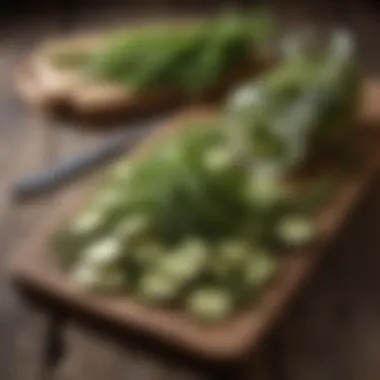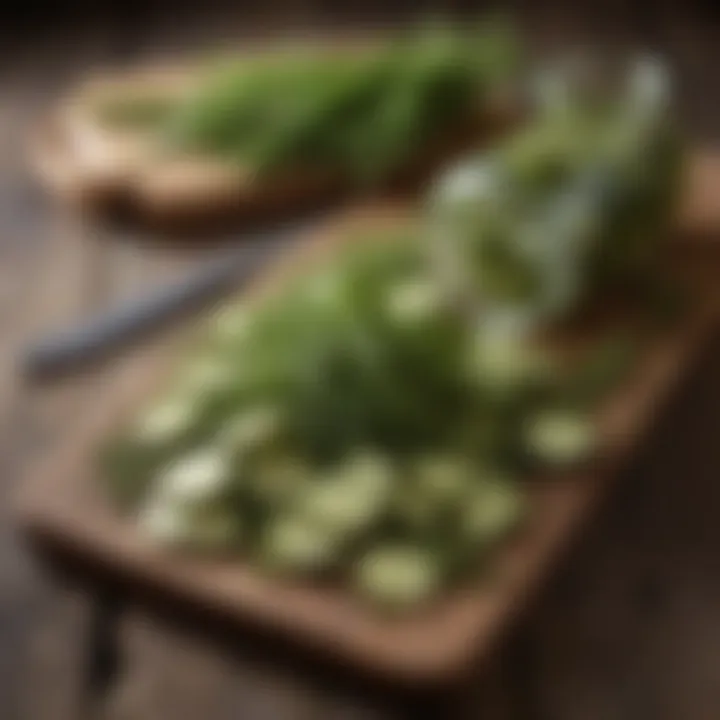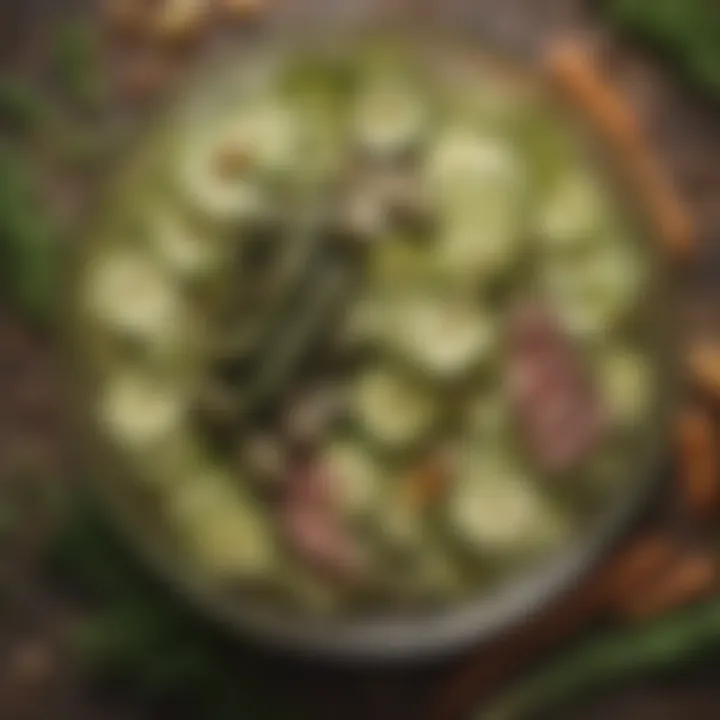Unlocking the Surprising Benefits of Dill Pickles


Intro
Dill pickles, often thought of as a simple condiment, are much more than just an accompaniment to sandwiches or burgers. Their unique flavor and crunch can enhance a variety of dishes and provide several health benefits. This article explores the multiple advantages of including dill pickles in your diet. Understanding their nutritional profile and potential effects on health can illuminate why they are a staple in many culinary traditions. From aiding digestion to potentially offering anti-inflammatory effects, dill pickles deserve a closer look.
Recipe Overview
Brief Description of the Dish
Dill pickles are cucumbers that have been soaked in a brine solution, typically composed of water, vinegar, salt, and dill, along with various spices. The pickling process transforms the crisp cucumbers into a tangy and flavorful snack that can be enjoyed on its own or as part of many dishes. They are low in calories and can contribute positively to one's health, making them a popular choice among health-conscious individuals.
Key Ingredients
- Fresh cucumbers
- Water
- White vinegar or apple cider vinegar
- Sea salt or kosher salt
- Fresh or dried dill
- Garlic (optional)
- Mustard seeds (optional)
Preparation Guidelines
Step-by-Step Instructions
- Preparation of Cucumbers: Start by selecting fresh, firm cucumbers. Wash them thoroughly to remove dirt.
- Creating the Brine: In a pot, combine water, vinegar, and salt. Heat the mixture until the salt dissolves completely, then let it cool.
- Adding Flavorings: In sterilized jars, place washed dill, garlic, and mustard seeds. Fill the jars with cucumbers, packing them tightly.
- Pouring the Brine: Carefully pour the cooled brine over the cucumbers, ensuring they are fully submerged.
- Sealing and Storing: Seal the jars tightly and store them in the refrigerator. For a more intense flavor, let them pickle for at least 48 hours before consumption.
Preparation Tips and Tricks
- Choose smaller cucumbers for a crunchier texture.
- Experiment with additional spices for distinct flavors, such as peppercorns or coriander seeds.
- Always ensure jars are well sterilized to prevent contamination during the pickling process.
By understanding the benefits and preparation of dill pickles, food lovers can discover a nutritious and delightful addition to their meals. The simple process of pickling can be a rewarding culinary adventure.
Prelude to Dill Pickles
Dill pickles have been a cherished food item in many cultures around the world. Their distinct flavor and crunchy texture make them a popular addition to various dishes. In this article, we aim to explore the benefits of dill pickles, beginning with their significance and appeal.
The popularity of dill pickles stems from their versatility. They can accompany sandwiches, salads, and even serve as flavor enhancers in numerous recipes. Beyond their culinary uses, dill pickles offer several nutritional advantages that are often overlooked. This section will highlight the essential aspects of dill pickles, considering their benefits, potential health properties, and reasons why they deserve a place in your diet.
Dill pickles are primarily made by soaking cucumbers in a brine solution, typically consisting of water, vinegar, and various spices. The process of pickling not only preserves the cucumbers but also infuses them with a unique flavor profile. The fragrant dill herb, combined with the tangy marinade, creates a satisfying culinary experience that appeals to many. In addition to taste, dill pickles are often low in calories, which enhances their desirability as a snack option.
Given their increasing visibility in health-conscious circles, it is essential to understand the importance of dill pickles in both nutrition and culinary creativity. They can play a role in enhancing gut health due to their probiotic content when fermented. Furthermore, their ability to provide hydration and replenish electrolytes is worth noting. Therefore, examining the nutritional content and health benefits of dill pickles will form the foundation for the ensuing sections of this article.
"Dill pickles are not just a condiment; they are a nutritional powerhouse that can support digestive health and offer a low-calorie snacking alternative."
In summary, dill pickles are much more than a simple addition to food. They are a complex ingredient that can contribute positively to one’s diet. Understanding their benefits will empower individuals to incorporate them more fully into their meals.
Nutritional Content of Dill Pickles
Understanding the nutritional content of dill pickles is essential for recognizing their value in a diet. These fermented vegetables are often dismissed as mere condiments, yet they contain several elements that contribute positively to health. While they can be a low-calorie addition to meals, their vitamin and mineral content, alongside their overall caloric value, requires attention.
Vitamin and Mineral Composition
Dill pickles are a source of various vitamins and minerals. For instance, they contain vitamin K, which plays a crucial role in blood clotting and bone health. A serving of pickles can provide a significant percentage of the daily recommended intake of vitamin K. Additionally, they have small amounts of vitamins A and C, both of which are important for maintaining healthy skin and immune function.
Other minerals found in dill pickles include potassium and magnesium, both vital for maintaining cellular function and overall wellness.
Key vitamins and minerals in dill pickles include:
- Vitamin K: Supports bone health.
- Vitamin A: Aids vision and immune function.
- Vitamin C: Important for skin health and immune defense.
- Potassium: Helps regulate blood pressure and fluid balance.
- Magnesium: Essential for muscle and nerve function.
Maintaining a balanced intake of these nutrients can assist in promoting overall health. However, one must consider that the nutritional benefits also depend on the type of pickling process used.


Caloric Value
The caloric value of dill pickles is notably low, which makes them an appealing choice for those looking to manage their weight. Generally, a single medium dill pickle contains about 4 to 5 calories. This low caloric density allows individuals to enjoy the flavor of dill pickles without significantly impacting their daily caloric intake.
Consuming low-calorie snacks can help in adhering to dietary goals, especially when they provide essential nutrients. Dill pickles serve as an excellent option for enhancing meals without adding excessive calories.
In summary, dill pickles offer nutritional benefits that extend beyond their low caloric value. Being mindful of the vitamins and minerals they provide can enhance their role in a well-rounded diet.
Health Benefits of Dill Pickles
Dill pickles are not only a popular condiment but also a source of various health benefits. Understanding the specific advantages of incorporating dill pickles into the diet can help individuals maximize their nutritional intake. These benefits include improved digestive health, maintaining electrolyte balance, serving as a low-calorie snack, and potential anti-inflammatory properties. Each of these areas merits further examination to appreciate how dill pickles can contribute to overall well-being.
Digestive Health
Role of Probiotics
Probiotics found in fermented dill pickles are essential for digestive health. These beneficial bacteria assist in the breakdown of food in the intestines. The key characteristic of probiotics is their ability to balance gut bacteria, which is crucial for effective digestion. This attribute makes probiotics a popular addition to many diets. A unique feature of probiotics in dill pickles is their ability to enhance nutrient absorption. This leads to better utilization of vitamins and minerals. Thus, adding dill pickles to meals can help improve overall digestive efficiency.
Impact on Gut Flora
The impact of dill pickles on gut flora is significant. Healthy gut flora plays a critical role in maintaining digestive health and preventing gastrointestinal issues. The key characteristic here is the diversity of beneficial bacteria stimulated by dill pickles. This diversity promotes a well-functioning digestive system. The unique feature of this impact is that a well-balanced gut flora can enhance immunity as well. Therefore, consuming dill pickles can be a proactive choice for maintaining good gut health.
Electrolyte Balance
Sodium Content
Dill pickles contain a notable amount of sodium, which is important for electrolyte balance. This feature is particularly beneficial for individuals engaging in intense physical activities. Sodium plays a crucial role in fluid balance, nerve function, and muscle contractions. However, it's essential to be mindful of this sodium content, especially for those with high blood pressure or heart conditions. Understanding how to balance sodium intake is crucial in using dill pickles as part of a healthy diet.
Hydration Benefits
Incorporating dill pickles into your diet can also offer hydration benefits. The salty nature of pickles encourages water consumption, and their liquid content can contribute to overall hydration levels. This characteristic is important in hot weather or after exercising. A unique aspect of hydration benefits from dill pickles is how they can be a refreshing snack option. Therefore, including dill pickles might help those seeking to maintain proper hydration without sugary drinks.
Low-Calorie Snack Option
Dill pickles rank as a low-calorie snack option, making them an attractive choice for those monitoring their weight. Each serving typically contains very few calories, allowing for guilt-free snacking. This quality can satisfy cravings without derailing a healthy eating plan. Integrating dill pickles into daily snacks can contribute to a balanced and healthy diet while providing essential nutrients.
Potential Anti-Inflammatory Properties
Dill pickles may provide potential anti-inflammatory properties due to the spices used in their preparation. Ingredients such as dill and garlic have shown possible effects in reducing inflammation in the body. The key characteristic of these properties is their ability to aid in recovery from injuries or strenuous workouts. A unique feature of this anti-inflammatory benefit is that it can complement an active lifestyle. Thus, consuming dill pickles might be useful for athletes or individuals seeking to reduce inflammation naturally.
Dill Pickles and Weight Management
Weight management is a significant concern for many individuals. Food choices play a crucial role in achieving and maintaining a healthy weight. Dill pickles can be an advantageous addition to one’s diet for several reasons.
Role in a Balanced Diet
Dill pickles are low in calories, making them an attractive choice for those looking to manage their weight. One medium dill pickle contains approximately 5 calories, which is minimal compared to many other snack options. Their low caloric value allows for guilt-free snacking. Moreover, being a pickled vegetable, dill pickles can add flavor without unwanted calories. This makes them a versatile food that fits easily into various meals and snacks without compromising taste.
In addition to being low in calories, dill pickles contribute to feelings of fullness. They often contain dietary fiber, especially when prepared through fermentation. Fiber is essential for digestion and helps maintain a sense of satiety, which can reduce overall food intake throughout the day. Incorporating dill pickles into meals, such as salads or sandwiches, can enhance texture and taste, encouraging a balanced diet rich in various nutrients.
Comparison with Other Snacks
When comparing dill pickles to other snacks, they stand out for their nutritional profile. Here are some considerations:
- Caloric Content: Dill pickles rank far lower in calories than traditional snack foods like potato chips or candy bars.
- Sodium Levels: While dill pickles do contain salt, moderation is key. They still offer a better choice than other high-calorie snacks laden with unhealthy fats.
- Added Nutrients: Other snacks may lack vitamins and minerals. Dill pickles provide small amounts of vitamins, such as vitamin K and some antioxidants, enhancing their health profile.


Dill pickles serve as a snack that can help maintain a balanced diet while also supporting weight management goals.
In summary, incorporating dill pickles into regular snacking habits can facilitate weight management by providing low-calorie options that can aid in feeling full. When pitted against more traditional snacks, their qualities shine, encouraging healthier choices while still allowing for flavor and enjoyment in meals.
Different Types of Dill Pickles
Understanding the different types of dill pickles is key to appreciating their unique qualities and health benefits. Dill pickles vary mainly based on their preparation method, specifically fermentation and brining. Each method has distinct flavors, textures, and nutritional properties that cater to diverse palates and dietary needs.
Fermented Dill Pickles
Fermentation is a traditional method that not only preserves cucumbers but also enhances their health benefits. Fermented dill pickles are made using a natural process which involves the conversion of sugars into acids by bacteria.
This results in a tangy taste, a crunchy texture, and the presence of beneficial probiotics. These probiotics are known for supporting gut health. The fermentation process creates a community of good bacteria that aid digestion and improve intestinal flora.
In addition to probiotics, fermented dill pickles are also rich in vitamins and minerals. The action of these bacteria means that the nutrients may become more bioavailable, making it easier for the body to absorb them.
Some potential benefits of fermented dill pickles include:
- Supporting healthy digestion
- Enhancing nutrient absorption
- Providing potential immune support
However, it is important to note that not all pickles labeled as fermented contain live cultures. When looking for fermented dill pickles, be sure to check for labels indicating live and active cultures.
Brined Dill Pickles
Brined dill pickles represent another popular method for making this beloved snack. Unlike fermented pickles, brined pickles rely on vinegar and salt to create a sour flavor and preserve the cucumbers.
The process typically involves immersing cucumbers in a solution made from vinegar, water, and salt along with dill and other spices. This method provides a quicker approach compared to fermentation, allowing the pickles to develop flavor in a matter of days rather than weeks.
Brined dill pickles are known for their sharp and tangy taste. They often feature a crisper texture, due to the acidity from vinegar. These pickles generally have a longer shelf life, making them suitable for those who prefer convenience.
While they may not carry the same probiotic benefits as fermented dill pickles, brined dill pickles can still fit well into a balanced diet. They provide flavor without significantly increasing caloric intake. Additionally, they offer some vitamins and minerals but typically have less probiotic content.
In summary, whether one prefers the probiotic-rich fermented dill pickles or the conveniently zesty brined variety, both types offer distinctive experiences and flavors worth exploring in meals and snacks.
Making Your Own Dill Pickles
Creating your own dill pickles is an enriching process that offers multiple advantages. Not only does it allow for customization according to personal taste, but it also grants control over the ingredients used. This is essential for those who are mindful about preservatives or additives that store-bought versions might contain. Additionally, making dill pickles at home can be a cost-effective option, especially if you consume them frequently. Understanding how to make dill pickles can deepen your appreciation for this popular condiment.
Ingredients Required
The core ingredients for making dill pickles typically include:
- Fresh cucumbers, preferably small pickling varieties
- Fresh dill sprigs
- Garlic cloves (optional)
- Vinegar, usually distilled white or apple cider vinegar
- Water
- Pickling salt or kosher salt
Each ingredient plays a crucial role. The cucumbers provide the base flavor, while the fresh dill adds the characteristic aroma. Vinegar is key for the sourness and for preservation. Salt helps with the brining process, ensuring that the cucumbers maintain a firm texture while enhancing the overall flavor.
Step-by-Step Process
Preparation
Preparation is an essential phase in making dill pickles. It begins with selecting fresh, unblemished cucumbers. They should be washed thoroughly to remove any dirt or impurities. Cutting the cucumbers into desired shapes, whether spears or slices, influences how they absorb the brine. The goal here is to create uniform pieces that will pickle evenly. This attention to detail is a key characteristic of good preparation. Proper preparation not only enhances the taste but ensures a quality end product.
Fermentation
Fermentation is a significant step, especially for those opting for a probiotic-rich version of dill pickles. During fermentation, naturally occurring bacteria convert the sugars in cucumbers into lactic acid. This not only preserves the pickles but also adds a tangy flavor. Fermentation requires a controlled environment, ideally at cooler temperatures, to encourage the right kind of bacteria to thrive. The lengthy fermentation process yields a unique flavor profile that many find appealing. However, it’s important to monitor the fermenting cucumbers closely to prevent undesirable spoilage. Fermentation contributes depth to the flavor and can enhance health benefits.


Storage
Storage is the final step in the pickle-making process. Once the dill pickles have reached the desired level of fermentation, they should be transferred to jars. When sealing the jars, make sure to leave some headspace at the top to allow for expansion. It’s important to use airtight containers, as this will maintain freshness. Proper storage can extend the shelf life of the pickles significantly, sometimes up to a year when refrigerated. Choosing the right storage method is vital for preserving both taste and quality.
"Making your own dill pickles allows you to explore flavors and adjust recipes according to your palate while ensuring the quality of ingredients."
Culinary Uses of Dill Pickles
Dill pickles are not just a flavorful snack; they also add distinct taste and texture to various dishes. Their versatility shines in many culinary contexts. Understanding how to use dill pickles in meals can greatly enhance flavors and provide additional health benefits. They can serve as a low-calorie option that brings zest to both simple and complex dishes. This section explores several common culinary uses of dill pickles, emphasizing their role in salads, as condiments, and in sandwiches.
In Salads
Dill pickles can elevate salads in ways many might not initially consider. When chopped and mixed into leafy greens, they introduce a tangy burst that contrasts beautifully with creamy dressings. They mingle well with ingredients like cucumbers and tomatoes, creating a refreshing medley. Furthermore, the crunchiness of pickles offers a delightful textural contrast, making salads more enjoyable to eat.
Some popular salad types that benefit from the addition of dill pickles include:
- Potato salad: Chopped pickles enhance the flavor without adding excessive calories.
- Tuna salad: The sharpness of dill pickles complements the richness of tuna, creating a balanced dish.
- Coleslaw: Incorporating pickles introduces acidity that brightens the overall flavor.
As Condiments
Dill pickles often serve as an ideal condiment. They pair well with a wide range of foods from burgers to hot dogs, acting as a counterpoint to heavier items. Their ability to cut through rich flavors makes them indispensable in certain meals. Many home cooks appreciate the way they can transform a simple dish into something special.
Common uses include:
- Topping for sandwiches: Slices of dill pickle add enhanced flavor to various types of sandwiches.
- Accompaniment to charcuterie boards: Mixed with cheeses and meats, they provide contrast both in taste and texture.
- Dipping sauce: Chopped and mixed with sour cream or yogurt can create a zesty dip.
In Sandwiches
Sandwiches become more satisfying with the addition of dill pickles. Their bold flavor can complement meats, cheeses, and spreads. Particularly in classic combinations, they have found their place in elevating the overall experience.
Consider the following popular sandwich types featuring dill pickles:
- Reuben sandwich: This classic deli fare sees layers of corned beef, Swiss cheese, and sauerkraut made complete with slices of dill pickle.
- Club sandwiches: Dill pickles nestle perfectly alongside turkey, ham, and bacon, enhancing each bite with acidity.
- Vegetable sandwiches: Even in vegetarian options, dill pickles add depth to salads and spreads.
Dill pickles not only contribute flavor but also offer nutritional benefits, making them a smart addition to many meals.
Potential Risks of Consuming Dill Pickles
While dill pickles can offer numerous benefits, it is also essential to acknowledge the potential risks associated with their consumption. A comprehensive understanding of these risks helps consumers make informed choices about including dill pickles in their diets.
Sodium Considerations
One significant concern regarding dill pickles is their sodium content. Many commercially produced dill pickles are preserved in salt brine, which can lead to high sodium levels. According to the American Heart Association, excessive sodium intake is linked to high blood pressure and an increased risk of cardiovascular diseases. Just one medium dill pickle can contain up to 500 milligrams of sodium or more, depending on the brand and recipe.
In the context of a balanced diet, moderation is key. For individuals who are sensitive to sodium or those with preexisting health conditions like hypertension, it is important to limit pickle consumption or seek low-sodium alternatives. Opting for fermented dill pickles, which may contain less salt, can also be a beneficial choice. Ultimately, being aware of the sodium content in your diet is crucial for maintaining optimal health.
Allergies and Sensitivities
Another aspect to consider is the potential for allergies and sensitivities. Although rare, some individuals may experience allergic reactions to dill or other ingredients commonly found in dill pickles. Symptoms can range from mild to severe, including skin reactions or digestive issues. It is important for those with known allergies to specific herbs or food additives to read labels carefully.
Additionally, some people may experience gastrointestinal discomfort after eating dill pickles. This can stem from the vinegar used in the pickling process or from the fermentation itself. If you are new to consuming dill pickles, it may be advisable to start with small portions to gauge your body's response.
In summary, while dill pickles have various health benefits, consumers must be mindful of sodium content and possible allergic reactions that may arise from their consumption. This awareness can lead to a more balanced and health-conscious approach to dietary choices.
Ending
In this article, we have thoroughly explored the many benefits of consuming dill pickles. From their nutritional value to their health advantages, dill pickles offer impressive contributions to a balanced diet.
One of the most critical points discussed is their role in enhancing digestive health. The probiotics found in fermented dill pickles can support gut flora, which may foster better digestion. Additionally, their low-calorie nature presents a suitable option for those aiming to manage their weight without sacrificing flavor.
Dill pickles also play a significant part in maintaining electrolyte balance, owing to their sodium content. This characteristic can be particularly useful for hydration, especially after physical activities or during hot weather.
While indulging in this tangy snack, it is important to be aware of the sodium considerations. Although sodium is essential, excessive intake can lead to health issues. Thus, moderation is key. Also, those with certain allergies or sensitivities must approach consumption carefully to avoid adverse reactions.
Overall, the exploration of dill pickles reveals a complex profile of benefits coupled with some considerations. They serve as a versatile component in various meals, representing a blend of flavor, nutrition, and functional advantages worth including in one’s diet. Whether used in salads, sandwiches, or simply eaten alone, dill pickles can elevate meals and potentially contribute to wellness.
"Dill pickles can be not just a condiment but a potential health booster in your daily diet."
By understanding their health benefits alongside potential risks, individuals can make informed decisions on how to incorporate dill pickles into their eating habits. This balancing act between enjoyment and health is a valuable takeaway for every food lover.







